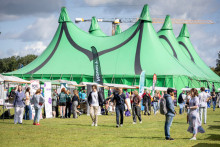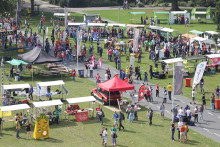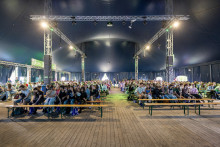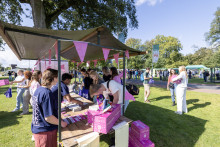When the working group was commissioned in June to take a closer look at the Kick-In, it quickly became clear that a thorough review was necessary. The group not only had to address the cost and intensity of the Kick-In, but also improve the connection between the central and the curricular part. With, among other things, the explicit instruction to save fifty thousand euros.
Although the steering group would like to see changes implemented during the 2026 Kick-In, the working group is tempering expectations. 'An important part of our advice is therefore: lower the ambitions,' says the chair of the working group and UT professor Arend Rensink. 'You don't implement drastic changes within six months. If you turn a knob, it affects the rest of the costs and the program.'
From goal to design
The working group, consisting of three UT employees and three students, consciously opted for a different approach. Not the current program was the starting point, but rather the goals of the Kick-In. These fall into four main themes: getting to know student life, the study and living environment and attention to well-being.
Based on interviews, discussions with other universities and an extensive survey, the working group compiled a list of twenty possible adjustments. 'We started brainstorming and thinking out-of-the-box. In the end, of those twenty elements, at least ten are really strong to apply,' Rensink thinks.
The most drastic recommendation is to shorten the Kick-In. 'We advise you to go from eight days to five or six. Students experience the current intensity as high.' He sees shortening the program as the starting point of the discussion. 'How exactly you fill in the days is up to the steering group.'
From 'Kick-In-camping'
One of the most striking ideas is the introduction of a 'Kick-In-camping'. The working group was inspired by the Batavierenrace. 'A campsite like this on the fields of the UT worked very well there. A campsite makes participation more accessible,' says Rensink. 'At recent editions, many students had to hope for a place to sleep or return home after activities.'
In addition, the campsite can be an additional source of income if it increases participation. But it is not easy: safety and available space still have to be investigated. In addition, major changes, such as this one, require the approval of the Executive Board and the University Council. That is why Rensink does not expect tents on the fields until 2027 at the earliest.
Introduction concert in danger?
The annual introduction concert in the city center of Enschede is also under discussion. The UT makes an annual financial contribution to the municipality for this purpose. For the working group, this contribution is a thorn in the side. 'That amount is substantial,' says Rensink. 'We have to ask ourselves whether this concert contributes to the goals of the Kick-In and whether it is worth that investment.' The advice: stop the contribution. If it is up to the working group, even immediately. Does this mean the end of the introductory concert? 'That is a possible consequence, but when the time comes, that decision is ultimately up to the municipality.' The working group chair expects this advice to meet with little resistance within the UT community.
The big tent
Initially, the big tent, the landmark of the Kick-In, also seemed to be a saving option. But that idea is completely off the table. 'The tent was at the top of our list to possibly delete, but we quickly changed our minds.'
So the working group has turned 180 degrees in his opinion. 'The tent must remain one hundred percent. This is now also stated in our advisory report. It is essential for the Kick-In experience. No other university has such a central place for speeches, parties and joint activities. In addition, alternatives to large locations, such as the FC Twente stadium, are simply too expensive to rent.'
According to the working group, the tent can also generate extra income.' By opening up some parties not only to first-year students but also to other students, you can charge entrance fees,' says Rensink. In addition, the working group argues for longer-term sponsorship contracts to create more financial stability.
It is up to the steering group
There was a lot of discussion within the working group. 'We were looking for harmony, but we didn't shy away from conflicts,' says Rensink. 'We have taken the objections from surveys seriously, but some recommendations remain.' Two weeks ago, the recommendations were sent to the steering committee.
Rensink expects that there will be support for the ideas and advice within the steering committee and especially the UT community. 'I assume that they see that changes are inevitable. Maybe it feels like we're breaking something down, but in the end we all strive for the same thing: a strong and future-proof Kick-In.'
The coming months will be decisive. The steering committee is in discussion with the Executive Board and the proposed decision will be discussed during the University Council meeting in January. 'Then we can get down to business,' says Rensink.






